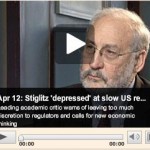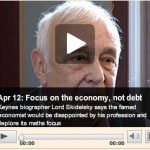Triple Crisis co-chairs sat down this month to discuss the rationale for the Triple Crisis blog and for Kevin Gallagher to ask Jayati Ghosh for insights on US financial regulatory reform, IMF reform, and the G-20 from a development perspective…
New Economic Thinking
 Earlier this month George Soros created an “Institute for New Economic Thinking,” and sponsored an inaugural conference with the aim to kick start a re-thinking of macroeconomics. Click here and below for video interviews with Soros, Joseph Stigltiz, and Robert Skidelsky who share some of their thoughts at the conference.
Earlier this month George Soros created an “Institute for New Economic Thinking,” and sponsored an inaugural conference with the aim to kick start a re-thinking of macroeconomics. Click here and below for video interviews with Soros, Joseph Stigltiz, and Robert Skidelsky who share some of their thoughts at the conference.
What are your thoughts on this project and these proposals? Is this the new economic thinking we need to prevent future crises?
Martin Khor on Climate Change, Border Taxes, and Green Protectionism
Why the IMF Changed its Mind about Capital Controls
On Triple Crisis, Ilene Grabel was the first to highlight the IMF’s change in position on capital controls. In this new video for the Guardian and in a related article for Foreign Policy magazine, Triple Crisis blogger Kevin Gallagher also notes the IMF’s acceptance of capital controls and argues that the US should follow suit and stop outlawing the use of controls through its trade and investment agreements.
Read “Control That Capital”, from Foreign Policy, along with more of Gallagher’s research on foreign investment for development.
Jayati Ghosh on the Crisis in Greece
For more on the financial crisis in Greece read Matias Vernengo: The Greek Present
Support for a Financial Transaction Tax
A number of the TripleCrisis contributors have joined an international coalition calling for the institution of an international financial transaction tax. The proposed tax, dubbed the “Robin Hood Tax,” would levy a small charge on trades in financial assets in order to potentially reduce speculation in financial markets, and generate significant revenue that could be invested in public projects or deficit reduction.
Read the economists letter backing the tax.
Read more about the proposed Robin Hood Tax.
Or watch the video:
Carbon Caps: Who gets the cash?
Any policy that limits supply of fossil fuels must raise their price. An inexorable economic logic binds price to scarcity, regardless of whether scarcity arises from OPEC-engineered production limits, climate policies to cap carbon emissions, or other initiatives that keep fossil fuels in the ground.
The key question is who gets the money? As governments move to cap carbon emissions, attention is turning to this hundred-billion-dollar question. In video interviews on the Real News Network, economist James K. Boyce outlines three possibilities:

